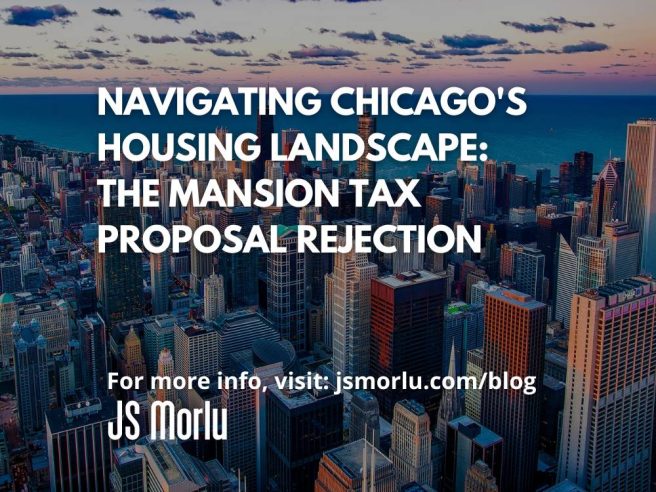Chicago’s housing market finds itself at a crossroads. Voters recently rejected Mayor Brandon Johnson’s proposal for a “Mansion Tax,” a measure aimed at raising funds for affordable housing and tackling homelessness. This article dives into the complexities of the issue, exploring the arguments for and against the tax, its potential impact, and the broader challenges facing Chicago’s housing landscape.
A Vision for Change, a Stumbling Block
Mayor Johnson, elected on a platform of increased contributions from the wealthy, envisioned the “Mansion Tax” as a cornerstone of his “Bring Chicago Home” initiative. The tax would have applied to real estate transactions exceeding $1 million. Proponents argued it could generate a significant annual revenue stream of $100 million, bolstering efforts to create affordable housing options and address the city’s growing homeless population.
However, voters ultimately sided with the tax’s opponents, who expressed concerns about its potential to exacerbate existing problems. John Hansen, a political science professor at the University of Chicago, highlighted Chicago’s already strained real estate market burdened by rising taxes and service costs.

A Real Estate Market on Edge
The Markellos family’s story serves as a potent illustration of these concerns. Owners of a 10-unit apartment building, they faced a staggering 440% property tax increase. This sharp rise, impacting a building with modest one-bedroom units, fueled anxieties about the proposed “Mansion Tax” potentially leading to further market destabilization.
This incident also exposed broader issues within Chicago’s tax administration and assessment practices. The Cook County Assessor’s Office, responsible for property valuations, faced criticism for reclassifying apartments, leading to exorbitant tax hikes for families like the Markelloses. Delays in property tax refund payments added further financial strain, particularly for residents on fixed incomes.
The Looming Shadow of Homelessness
Chicago’s housing challenges extend beyond affordability. With over 68,000 individuals experiencing homelessness in 2021, the city faces a pressing humanitarian crisis. Additionally, a recent influx of migrants has further strained resources, highlighting the need for innovative solutions.

Legal Hurdles and Economic Concerns
The “Mansion Tax” proposal wasn’t without its legal hiccups. Real estate trade organizations filed lawsuits arguing that the ballot language violated state statutes. Fiscal watchdogs, like the Civic Federation, expressed concerns about the potential impact on the city’s economic competitiveness, fearing it might deter investment and growth.
Los Angeles’ experience with a similar “Mansion Tax” offered a cautionary tale. Despite projections of substantial revenue generation, the tax fell short, collecting only $215 million in its first year – far below initial estimates. Rising mortgage rates, construction costs, and pre-emptive property sales were cited as contributing factors.
The Path Forward: A Delicate Balance
The fate of the “Mansion Tax” underscores the complex challenge of balancing societal needs with economic stability. Chicago must find creative solutions to address its housing crisis without jeopardizing its economic well-being. Here are some potential avenues:
- Streamlining Tax Administration: Improving the efficiency and transparency of property tax assessments and ensuring timely refunds can alleviate financial burdens on residents.
- Zoning Reform: Exploring zoning regulations that encourage development of mixed-income housing units can create a more diverse and inclusive housing landscape.
- Public-Private Partnerships: Collaborative efforts between the city and private developers can leverage resources and expertise to create more affordable housing options.
- Federal Funding: Lobbying for increased federal funding for affordable housing programs and homelessness initiatives can provide crucial support.
Chicago’s housing crisis is a multi-faceted issue demanding a multifaceted approach. By fostering open dialogue, exploring innovative solutions, and learning from other cities’ experiences, Chicago can chart a path towards a more sustainable and equitable housing market for all its residents.
JS Morlu LLC is a top-tier accounting firm based in Woodbridge, Virginia, with a team of highly experienced and qualified CPAs and business advisors. We are dedicated to providing comprehensive accounting, tax, and business advisory services to clients throughout the Washington, D.C. Metro Area and the surrounding regions. With over a decade of experience, we have cultivated a deep understanding of our clients’ needs and aspirations. We recognize that our clients seek more than just value-added accounting services; they seek a trusted partner who can guide them towards achieving their business goals and personal financial well-being.
Talk to us || What our clients says about us


